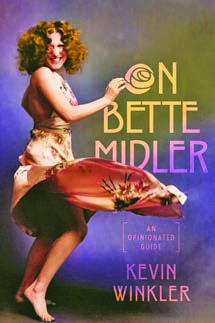Superb.
That word is appropriate in this situation. Fantastic, that’s another. Transcendent or celestial, if you’re of that mind, or perhaps anointed. There are many adjectives you can use for a performer who transports you, one who sings to your soul. Sensational, breathtaking, outstanding, or — as in the new book “On Bette Midler” by Kevin Winkler — another, better word may be more suitable.
Born in Hawaii a few months after the end of World War II, Bette Midler was named after film star Bette Davis. It was a perhaps auspicious start: despite a minor disparity (Midler’s mother thought the movie star’s first name was pronounced “Bet”), young Midler seemed at a young age to want to follow in her almost-namesake’s footsteps. By age 11, she’d won accolades and prizes for her performances and she “yearned to be a serious actor…” As soon as she could, she headed for New York to seize her career.
Alas, her “unconventional” looks didn’t help win the roles she wanted but she was undeterred. Unafraid of small venues and smaller gigs, she “just blossomed” in New York City. Eventually, she landed at the Improv on 44th Street; the owner there helped her negotiate some minor work. Another man became her manager and secured a job for her at the Continental, a New York bath house strictly for gay men. She was hired for eight summer nights, Friday and Saturdays only, for 50 bucks a night.
Almost immediately, her authenticity, her raunchy language and her ability to relate to her audience made her beloved in the gay community. Midler’s tenure at the Continental expanded and, though legend points to a longer time, she worked at the bath house for just over two years before moving on and up, to television, recording studios, movies and into fans’ hearts. Still, asks Winkler, “Did it really matter what stage she was on? She touched audiences wherever she performed.”
In his earliest words — and, in fact, in his subtitle — author Kevin Winkler reminds readers that “On Bette Midler” is a book that’s “ highly opinionated, filled with personal contemplations …” He is, in other words, a super-fan, but that status doesn’t mar this book: Winkler restrains his love of his subject, and he doesn’t gush. Whew.
That will be a relief to readers who wish to relish in their own fervor, although you’ll be glad for Winkler’s comprehensive timeline and his wide, wide look at Midler’s career. Those things come after a long and fascinating biography that starts in 1970, takes us back to 1945, and then pulls us forward through movies, television appearances, stage performances and songs you might remember — with appearances from Barbara Streisand, Barry Manilow and Cher. It’s a fun trip, part confidential, part charming, part nostalgic, and very affectionate.
Despite that this is a “personal” book, it’s great for readers who weren’t around during Midler’s earliest career. If you were and you’re a fan, reading it is like communing with someone who appreciates Midler like you do. Find “On Bette Midler.” You’ll find it divine.
— The Bookworm Sez


